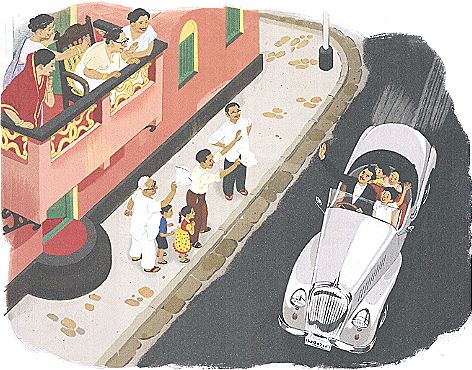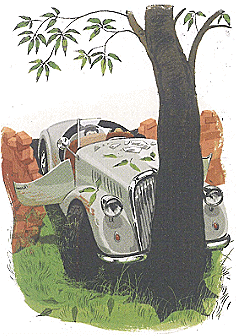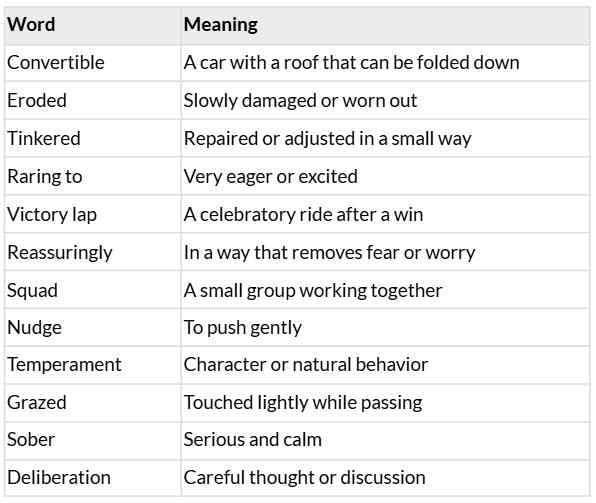Mr Young's Car Chapter Notes | Gul Mohar Class 6: Book Solutions, Summaries & Worksheets PDF Download
| Table of contents |

|
| About the Author |

|
| Detailed Summary |

|
| Moral / Message |

|
| Character Sketches |

|
| Vocabulary Table |

|
About the Author
Nabaneeta Dev Sen (1938–2019) was a celebrated Indian writer and scholar who wrote poems, novels, short stories, essays, and travelogues in Bengali. She also taught literature at universities in India and abroad. She received the Sahitya Akademi Award in 1999 and the Padma Shri in 2000 for her literary contributions.
Detailed Summary
This humorous story tells us about Mr Young, an Englishman and a friend of the narrator’s grandfather. When he leaves India, he gifts his small convertible car to Grandpa. Unfortunately, no one in the family knows how to drive, so the car stands unused until the narrator’s uncle arrives from Delhi. He is fond of cars and excitedly repairs it with the help of mechanics. The children are thrilled to take their first drive.
But during the ride, the family discovers something shocking—the car has no brakes! Uncle stays calm and tries to reassure everyone. He calls the children his “squad” and asks them to be ready to jump. Instead of stopping at a wall, the car crashes through it and halts inside a mango orchard. Luckily, nobody is hurt. Uncle proudly calls it his “finer touch,” though the gardener is very angry.
Eventually, the car is taken back to the workshop. Its parts are sold off and used in useful ways—a rickshaw, a flour mill, and even another car’s horn. In the end, when Mr Young writes asking about his car, Grandpa truthfully replies that the car is now “serving the people of the country.” The story highlights humor, irony, and the family’s excitement over the precious car.
Moral / Message
The story shows us the value of honesty, presence of mind, and humor in difficult situations. It also tells us that material things do not last forever, but they can still be useful in unexpected ways. Most importantly, it teaches us to stay calm in times of trouble, and to face problems with courage and creativity.
Character Sketches
Uncle
The narrator’s uncle is fun-loving, adventurous, and brave. Even when he realizes that the car has no brakes, he remains calm and lighthearted. He treats the children as his “squad” and handles the crisis with humor. His adventurous spirit makes him both lovable and slightly careless.
Grandpa
Grandpa is honest, practical, and thoughtful. He respects his friend Mr Young’s gift but also worries about safety. In the end, instead of hiding the truth, he writes honestly to Mr Young about how the car’s parts are being used for public good. His truthfulness and wisdom stand out.
Dad
Dad is responsible and serious. He worries about safety and scolds Uncle for his reckless behavior. He quickly takes control of the situation—paying the gardener, repairing the wall, and ensuring the car is put back in the workshop. He represents the voice of reason in the family.
Vocabulary Table

|
30 videos|61 docs|17 tests
|
FAQs on Mr Young's Car Chapter Notes - Gul Mohar Class 6: Book Solutions, Summaries & Worksheets
| 1. What is the main theme of "Mr Young's Car"? |  |
| 2. Who are the central characters in "Mr Young's Car"? |  |
| 3. What moral lesson can be derived from "Mr Young's Car"? |  |
| 4. How does the setting influence the story in "Mr Young's Car"? |  |
| 5. What vocabulary words are important to understand the content of "Mr Young's Car"? |  |




















